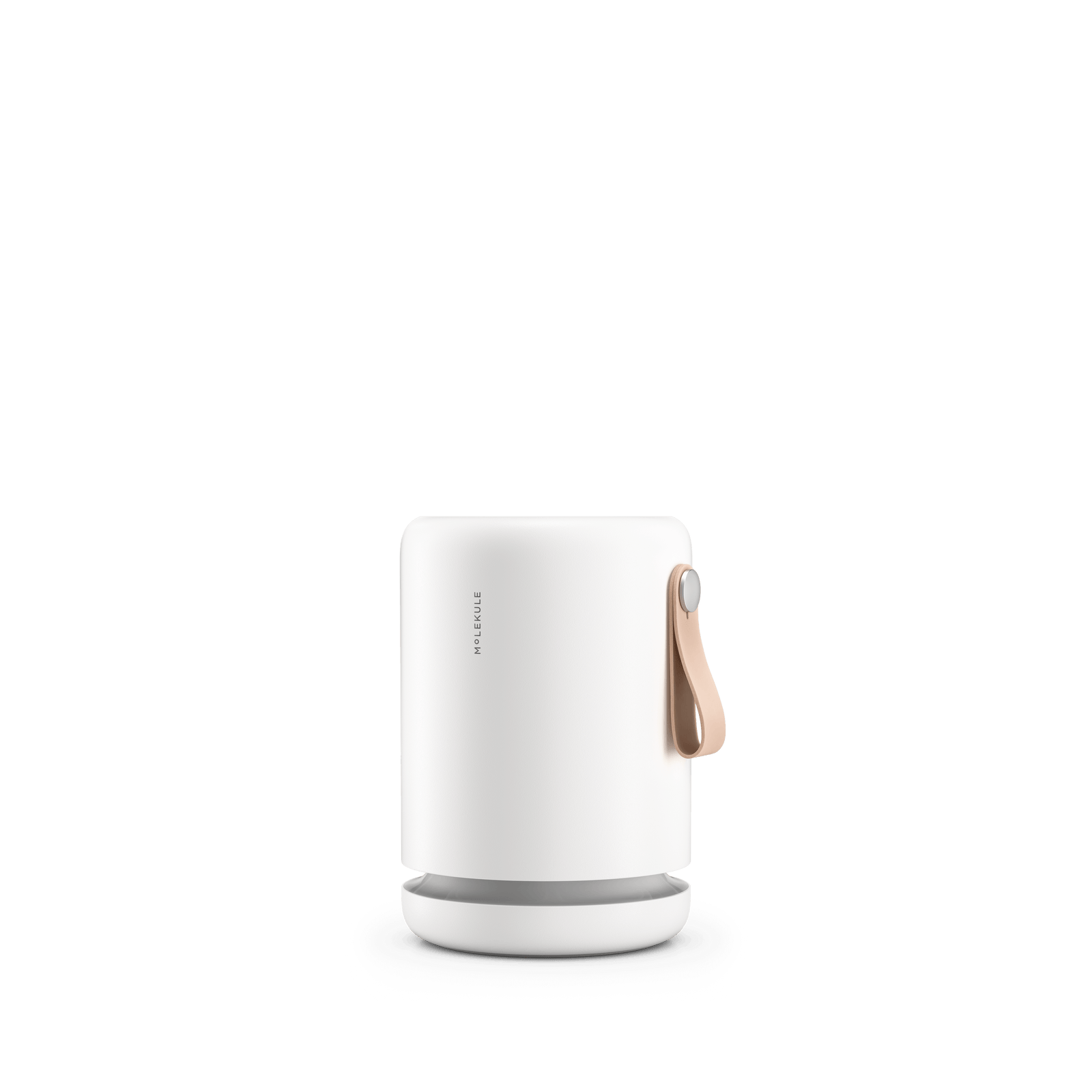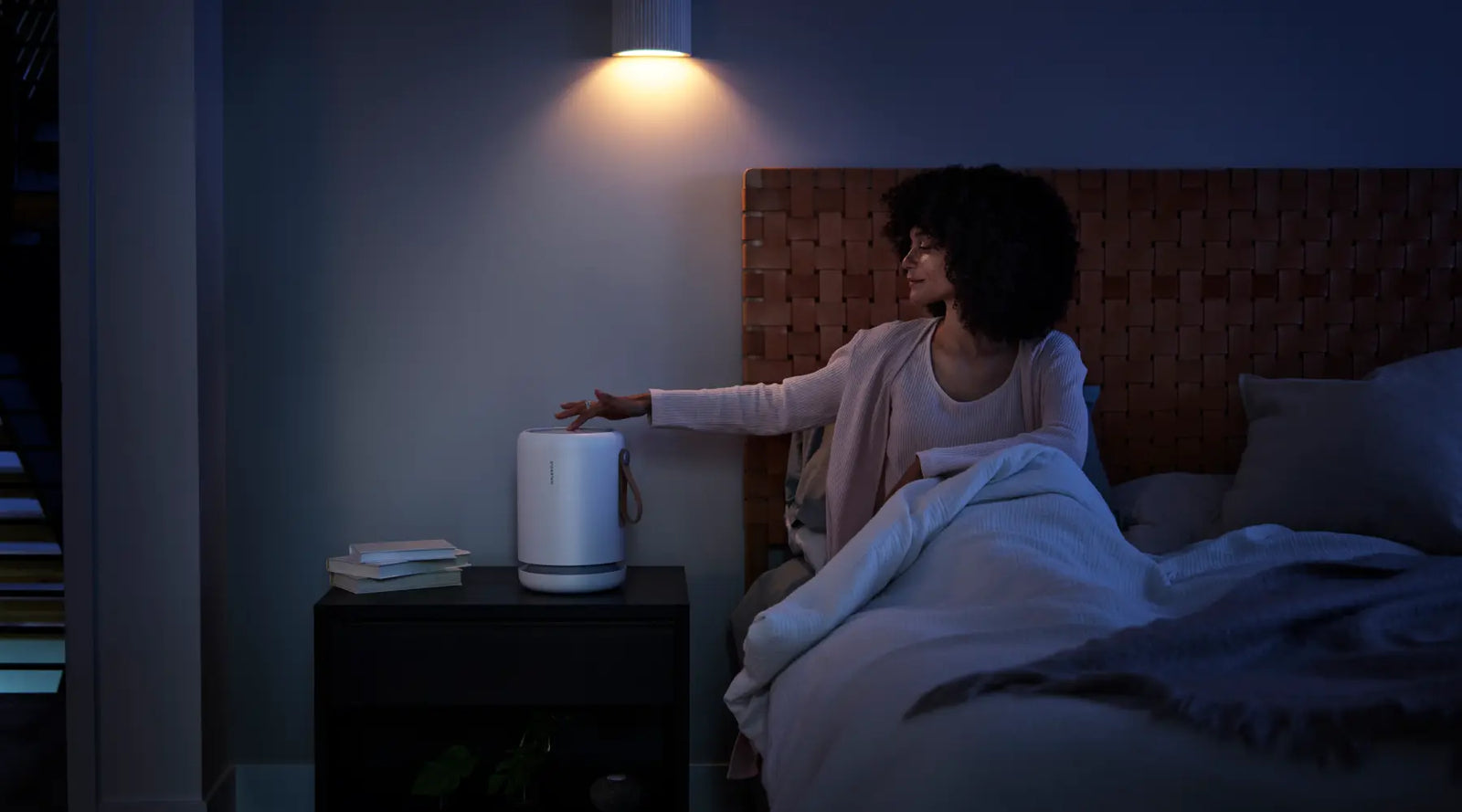Air purifiers and humidifiers can both impact the air you breathe in your home, but they each serve a different purpose with unique benefits. If you are looking for ways to help allergies, respiratory symptoms or dry air conditions, or if you want to create a healthy home environment for your baby, you should understand the differences between an air purifier and a humidifier, and how to use each one most effectively.
We will explain how each device works and the best ways to use them safely, as well as whether you should use an air purifier or a humidifier in different situations.
What is the difference between an air purifier and a humidifier?
An air purifier is used to clean the air by removing airborne particles or otherwise “inactivating” pollutants from the air. The two basic components of an air purifier are a fan and a filter surface, though the specific filtration technology can vary, from traditional HEPA filters to ionizers to brand-new PECO technology. In most air purifiers, air is passed through the unit, unwanted particles are trapped or removed on a filter and clean air is emitted back into the room. Air purifiers do not add any moisture to the air.
A humidifier, on the other hand, does not clean the air or remove airborne allergens. It simply adds water to the air by boiling water into steam, vibrating water droplets into the air with ultrasonic technology , or by evaporating the water using a fan and a wick. Note that ultrasonic humidifiers might also introduce tiny mineral particles into the air if tap water is used instead of distilled water. The health effects of these particles are not very well known, but research suggests that they could have some effects on lung tissue (Umezawa et al., 2013). The EPA recommends using distilled water and regularly cleaning and disinfecting your humidifier.
How do air purifiers and humidifiers impact your health?
Air purifiers and humidifiers have different impacts on air quality that can affect our health. Here are some of the most common conditions:
Asthma and allergies – Some air purifiers are designed to reduce allergen particles in the air, such as dust mites, pet dander, pollen or mold spores. Many people who suffer from allergies or common asthma symptoms use an air purifier to reduce their exposure to these triggers. These allergens are carried on particles floating in the air, often so tiny they become suspended for hours at a time. Traditional air filters capture these particles, while the Molekule air purifier is the only technology that can effectively destroy allergens.
Humidifiers, on the other hand, have no impact on allergen levels. Instead, they may help allergy symptoms feel less severe if your nasal passages are dry and irritated. Note that humidifiers do not reduce allergy or asthma symptoms, and they might even increase the risk of allergies and asthma (Svendsen, Gonzales & Commodore, 2018). Moreover, if a humidifier is not properly cleaned, it can develop mold and actually introduce airborne pollutants such as mold spores into the air, triggering allergy and asthma symptoms, as well as other health issues.
Colds, flu and respiratory irritation – Common types of air purifiers capture particles in the air, though some particles that carry viruses are so tiny they can pass through regular air filters. Though an air purifier cannot help an existing cold, it might ease your symptoms by removing other respiratory irritants from the air.
According to the NIH, a humidifier may help relieve a stuffy nose and the discomfort of colds or flu. The right level of humidity may also provide a protective benefit from viruses. According to several studies (Lapidus et al., 2013), increasing the humidity in the air to a range of 40-60 percent reduces the infectiousness of viruses. It is also important to understand that a humidifier cannot cure you once you are already sick, but can make symptoms less miserable by preventing a scratchy, dry nose and sore throat.
Dry air – An air purifier does not add moisture to the air, so it will not help with excessively dry air, which can exacerbate a range of respiratory ailments, including asthma, bronchitis and sinusitis.
A humidifier increases the moisture levels in the air, thus increasing relative humidity and improving dry air conditions, especially for those who live in an arid climate. When the air is too dry, often during winter when the heater is on, it can irritate your nose and throat.
Learn the difference between an Air Purifier and Humidifier
Air Purifier vs Humidifier: Which works better for different conditions?
Wondering whether you need an air purifier or humidifier? Either one might be better than the other in different circumstances.
For baby – A humidifier can be better in the nursery if the main problem is dry air, and as mentioned above they can prevent dry, scratchy nose and throat irritation. The FDA states that using a cool mist humidifier may help infants who have cough and cold symptoms, by shrinking nasal passages and helping them breathe easier. However, a warm mist humidifier should not be used, as it can have the opposite effect by causing nasal passages to swell, making breathing more difficult. When humidifiers are used to maintain an ideal relative humidity of 40 to 60 percent, they can also reduce the infectiousness of bacteria and viruses.
For long term air quality, an air purifier can reduce pollutants in the air, including potential toxins from tobacco smoke, “out-gassing” plastics, allergens and asthma triggers like mold spores, dust particles or pet dander and pollen, and other possible respiratory irritants. This makes an air purifier a better choice for a baby’s room year-round.
For allergens – An air purifier can help reduce allergens levels in the air. A unit with a HEPA filter can help trap particles, though the Molekule technology goes beyond that by destroying allergens in the air. Though humidifiers may help soothe a stuffy nose or other irritation, they can actually make allergies worse because higher humidity improves the survival rates of dust mites (Berkeley Lab).
For asthma – A humidifier can ease asthma symptoms if dry air is also a problem, but it does not affect asthma itself, and higher indoor humidity levels are actually associated with asthma attacks because they can trigger the growth of harmful bacteria, dust mites and mold (Mayo Clinic). Since asthma attacks are often triggered by pollutants in the air, an air purifier that can remove those pollutants is better for asthma.
Remember that a humidifier must be kept clean, ideally allowed to dry and be wiped down every few days after use. Otherwise, mold growth can form inside or on the humidifier, and it will then emit mold spores into the air, triggering the kinds of allergy or asthma attacks you want to avoid.
Can I use both an air purifier and humidifier together?
Because both an air purifier and a humidifier perform completely different functions (key difference being the removal of pollutants from the air as opposed to adding moisture to the air), they can be used together, even in the same room. However, you should avoid placing them too close together because the moisture from the humidifier could clog filters or otherwise limit the effectiveness of the air purifier. For instance, if a HEPA filter were to be consistently damp because the output of a humidifier was directed into it, the dampness could promote the growth of mold or bacteria on the filter. This can be avoided by placing them at opposite ends of the room.
To operate effectively and prevent indoor air pollution, both air purifiers and humidifiers need to be properly maintained. For a humidifier, this means frequent cleaning. It’s also important to use distilled water with ultrasonic humidifiers to avoid adding mineral particles to the air, which might be harmful to your lungs, particularly those of young children and infants (Daftary & Deterding, 2011). For an air purifier, maintenance primarily means replacing filters regularly.
Our solution
The Molekule air purifier is a long-term solution for indoor air quality in your home, to help you and your family breathe clean air year-round. While a humidifier is often used on a short-term basis when the air is too dry or a family member has a cold, an air purifier can be used every day to reduce allergen and other pollutant levels in the air. Unlike traditional air filters that simply catch pollutants on filters, the Molekule air purifier destroys viruses, airborne chemicals and allergens like mold, pollen and dust mites, providing clean air to you and your family.













